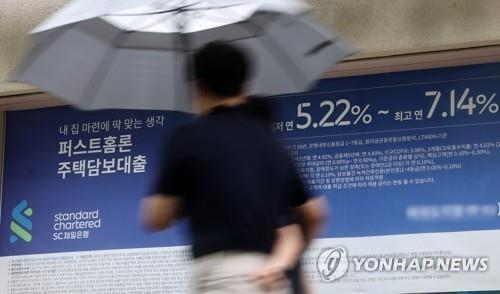(LEAD) Banks' household loans up for 8th month in November amid high rates
(ATTN: ADDS details in paras 4-6)
SEOUL, Dec. 13 (Yonhap) -- Household loans extended by banks in South Korea rose for the eighth straight month in November, led by rising home-backed loans, central bank data showed Wednesday, amid worries that highly indebted households could pose a risk to Asia's fourth-largest economy amid high borrowing costs.
Banks' outstanding household loans had come to 1,091.9 trillion won (US$831.6 billion) as of end-November, up 5.4 trillion won from a month earlier, according to the data from the Bank of Korea (BOK).
The November gain decelerated from a 6.7 trillion rise the previous month, but marks an on-month rise for eight months in a row, the data showed.
The rise in household loans extended by all financial institutions also slowed from a month earlier in November due to a sharp decline in loans extended by nonbank lenders, such as credit unions and insurers, according to the Financial Services Commission (FSC).
Household loans extended by nonbank financial institutions dropped by 2.8 trillion won last month, limiting the rise in overall household loans to 2.6 trillion won, compared with a 6.2 trillion-won increase in October, according to the financial regulator.
The FSC said it will continue to closely monitor household debts despite the slowdown in their increase, noting the debts continue to remain "considerably large."
Banks' home-backed loans rose 5.8 trillion won to 845.3 trillion won last month, accelerating from a 5.7 trillion won on-month gain the previous month, while unsecured and other types of loans fell 0.3 trillion won to 245.4 trillion won over the cited period, according to the data.
In the first 11 months of the year, banks' household loans surged 33.9 trillion won, a sharp turnaround from a decline of 2.9 trillion won during the same period of last year, according to the data.
Policymakers remained worried over a spike in household debts, which could sap further private spending amid a weak economic recovery.
Borrowing costs in Asia's fourth-largest economy remain high following the BOK's aggressive monetary tightening aimed at bringing surging inflation under control.
Last month, South Korea's central bank held its key interest rate steady at 3.5 percent for the seventh straight time amid a slowdown in growth and moderating inflation.
This marked the seventh straight time that the BOK has stood pat following rate freezes in February, April, May, July and August. The rate freezes came after the BOK delivered seven consecutive rate hikes from April 2022 to January 2023.
Last year, outstanding household loans slipped for the first time in 18 years amid higher rates.
Banks' loans to companies also continued to rise amid high demand.
Corporate loans extended by banks rose 7.3 trillion won last month, slowing from an 8.1 trillion won rise the previous month, the data showed.

This file photo, taken July 18, 2023, shows information about a bank's loan programs in Seoul. (Yonhap)
sam@yna.co.kr
(END)
-
Prosecution drops charges against Chinese woman for attempting to trespass on BTS Jungkook's home
-
Prince Group stashes away over 90 bln won at Cambodian branches of S. Korean banks: lawmaker
-
S. Korea calls in Vietnamese defense attache over alleged sexual misconduct
-
(Movie Review) 'The First Ride' buckles up for more than joyride
-
Defense chief says Osan Air Base raid did not require U.S. consultations
-
Prosecution drops charges against Chinese woman for attempting to trespass on BTS Jungkook's home
-
Prince Group stashes away over 90 bln won at Cambodian branches of S. Korean banks: lawmaker
-
S. Korea calls in Vietnamese defense attache over alleged sexual misconduct
-
(5th LD) 64 nationals detained in Cambodia over alleged online scams return home, face probes
-
(Movie Review) 'The First Ride' buckles up for more than joyride
-
Prosecution drops charges against Chinese woman for attempting to trespass on BTS Jungkook's home
-
(2nd LD) N. Korea says it tested 2 hypersonic projectiles, successfully hit target
-
(LEAD) Lee welcomes Trump's role as 'peacemaker,' brushes aside U.S. trade concerns: CNN
-
Around 20 N. Korean soldiers briefly cross MDL, retreat after warning shots
-
(2nd LD) Trump to hold bilateral talks with Lee, Xi in S. Korea next week: White House